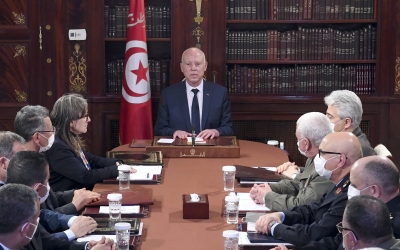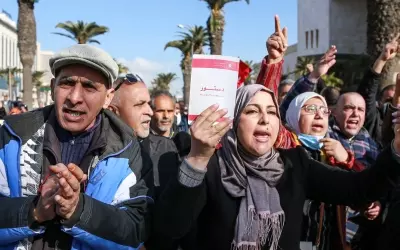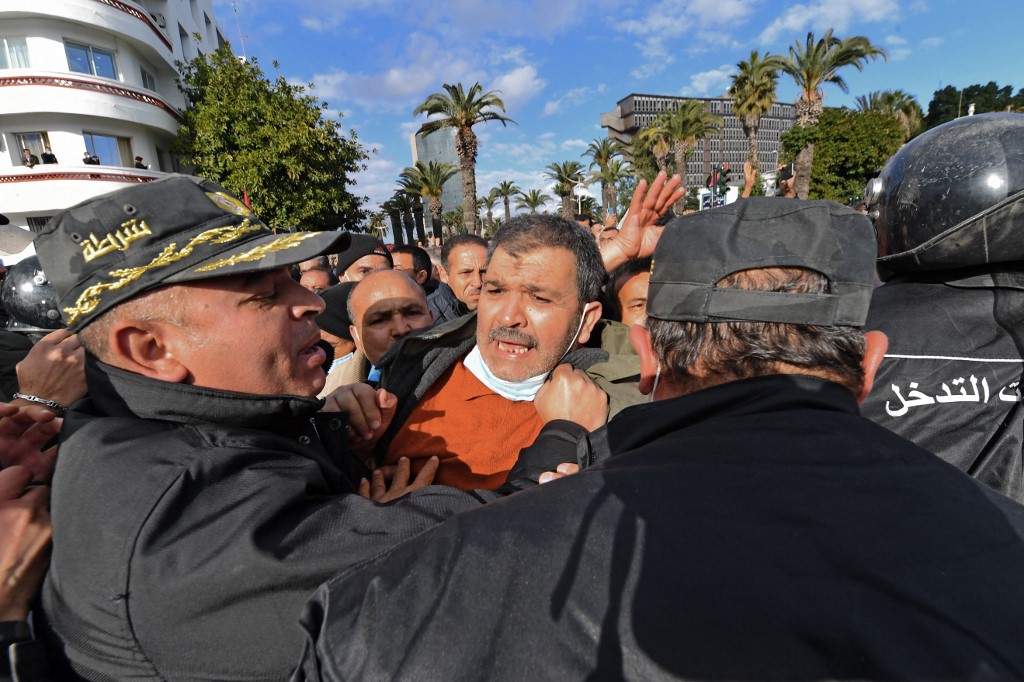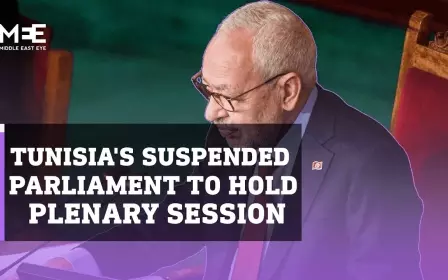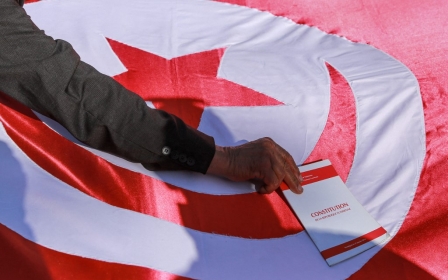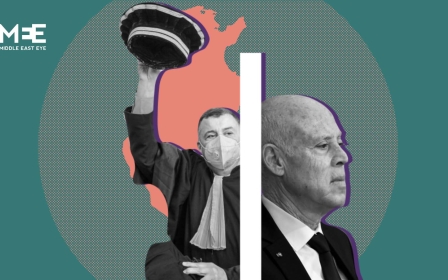Tunisia: MPs denounce Kais Saied amid talks to secure international funding
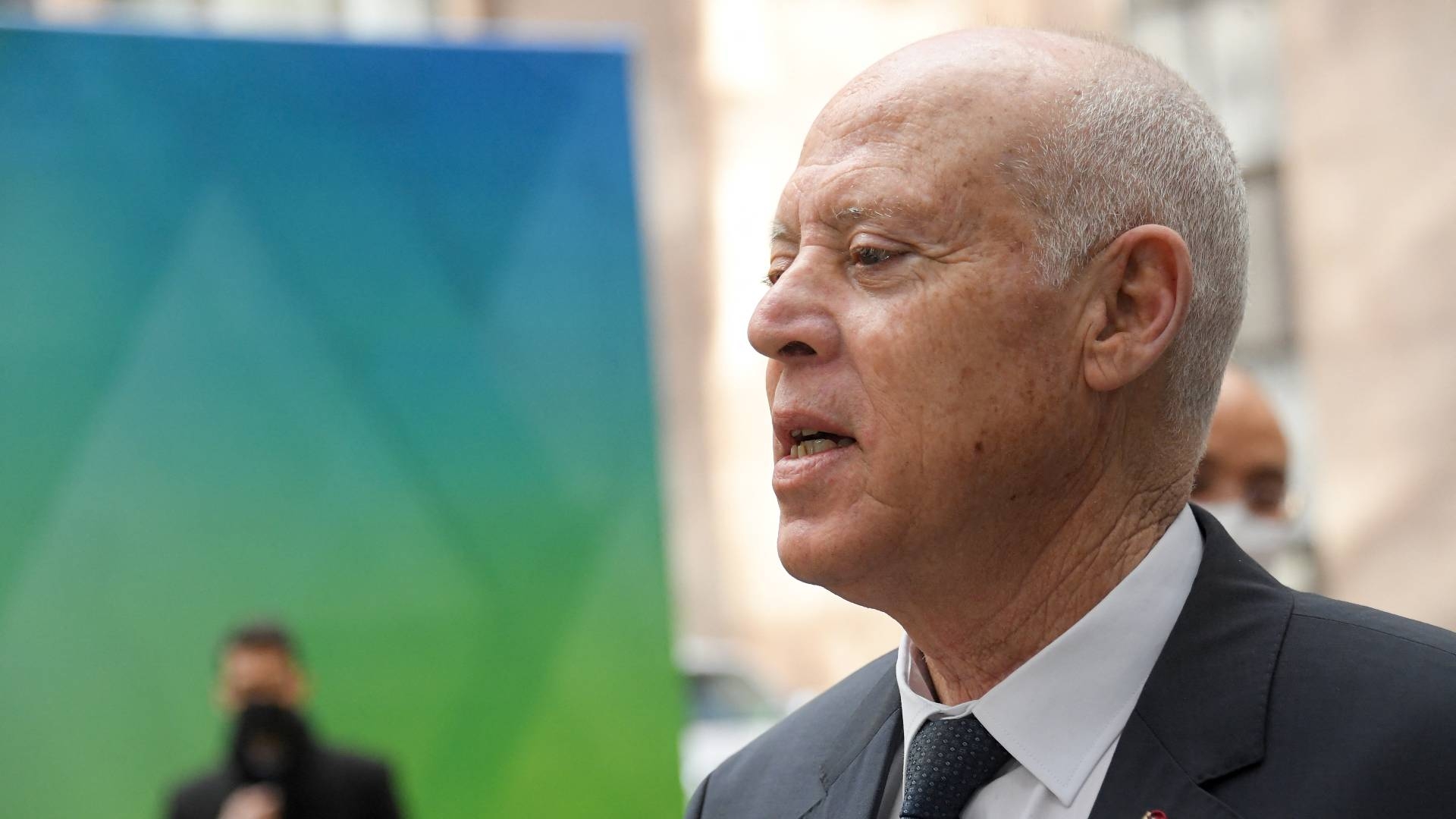
Several Tunisian politicians have voiced their fears over the future direction of their country to Middle East Eye during a visit to London to meet the UK's Tunisian community and explain Tunisia's political standoff to the British public.
Tunisian MPs Issam Bargougui and Oussama Khlifi, along with the former minister Ahmed Gaaloul, spoke with MEE on Friday, just days before President Kais Saied dissolved the country's parliament and threatened to prosecute MPs after they held the assembly's first online session since Saied's suspension of parliament last year.
New MEE newsletter: Jerusalem Dispatch
Sign up to get the latest insights and analysis on Israel-Palestine, alongside Turkey Unpacked and other MEE newsletters
Sitting in a hotel in central London alongside Khlifi and Gaaloul, Bargougui says he was dismayed earlier this month when a military court sentenced him in absentia to 10 months in prison on charges of insulting the army and Saied.
Currently living in exile in the British capital, he has been watching anxiously from afar as the country he once held high hopes for struggles against a series of strikes in vital services, tit-for-tat rows and what he says are increasing attacks on its democracy.
Khlifi, a member of Qalb Tounes (Heart Of Tunisia), the country's second-largest political bloc, described Saied as an "emperor" after he suspended parliament and revoked parliamentary immunity last July.
In the months following what most political parties denounced as a coup, the country's economy has continued to go downhill.
In recent weeks, Tunisia has seen bread prices soar 25 percent in unsubsidised bakeries following Russia's invasion of Ukraine, as well as spiralling energy costs.
A rubbish collectors' strike, calling for better wages and working conditions, led to piles of trash blocking streets and pavements in Tunis and Sfax, while a strike by gas canister distributors, who serve remote villages, left homes struggling to cook their meals.
"Saied blocked all the demands to reach economic stability," Khlifi told Middle East Eye. "We fear that Tunisia will witness a hunger revolution caused by Saied's coup and tyranny."
'We fear that Tunisia will witness a hunger revolution caused by Saied's coup and tyranny'
- Oussama Khlifi, former Tunisian MP
Meanwhile, Saied, who first came to power in 2019, has accused his rivals of corruption, collaborating with foreign countries and conspiring against the state.
"He depicted himself as the saviour who will rescue Tunisians, get rid of the corruption, and return the money to the state coffers," Bargougui, the head of the al-Mustaqbal party, told MEE.
"But after eight months of his coup, we are seeing that these are just lies."
Bargougui, who grew up in Sidi Bouzid where the Tunisian revolution started in 2010, says he feels bitter over what he says was Saied's use of democracy as a bus ride to reach power.
A fierce critic of the president, he had called for the army to arrest the Saied, which prompted his military trial.
'Wrong to involve military institutions'
Since July, Saied has dismissed the prime minister Hichem Mechichi, dissolved the Supreme Judicial Council, and criticised the role of the Independent High Authority for Elections body and the Anti-Corruption Committee.
On Wednesday, he finally dissolved parliament, denouncing the assembly's passing of a bill against the "exceptional measures" taken by himself as a "coup attempt".
Gaaloul, a former youth and sports minister and a senior member of the Ennahda Movement, told MEE that "it is wrong to involve military institutions in shutting down parliament and involve military courts in the trial of civilians and politicians".
Ennahda had controlled the suspended parliament after the security forces shut its gates.
On Tuesday, Saied reportedly attempted to put Speaker Rached Ghannouchi, who is also the head of Ennahda, and other MPs under house arrest after they said they would resume parliamentary work this week.
"Who is destroying the state is Saied. We don't have any issues with the military and security establishment in Tunisia. We actually defend these institutions," Gaaloul said.
"However, Saied is a threat to all of us. We defend the policeman because he also can't find the salary to live a dignified life."
'Threat to us all'
Amid Tunisia's economic crisis, Gaaloul told MEE that any international donors thinking of offering funds to the country should consider the rights violations that have occurred over the past year.
Following weeks of talks, the World Bank approved on Tuesday a $400m finance package to help almost 900,000 Tunisian households cope with economic hardships caused by the Covid-19 pandemic.
'The political parties are attempting to face the coup and the injustice and stop the state’s resources haemorrhaging under Saied'
- Oussama Khlifi, MP
However, the Tunisian government is still in talks to secure $4bn from the International Monetary Fund (IMF) for its yearly budget.
The MPs believe that such a funding package would embolden Saied and not help solve the country's political tensions.
“He (Saied) should backtrack his decisions," Gaaloul said.
"He is actually deepening the corruption in the country with his policies. There is no state now, there’s only a one-man show.”
Khlifi added that Tunisia should reach political stability “in order to be able to collect money for donors to fund the budget and attract investors to the country”.
'Consulting himself'
In February, Saied undertook a so-called “popular consultation”, carried out online to seek Tunisians' support to make changes to the constitution.
The president's move also appeared aimed at showing that he was popular and a man of the people.
However, the consultation suffered technical issues and attracted a low turnout. Saied said in March that only half a million people had voted.
“The president is basically consulting himself,” Gaalouil said.
For Bargougui, this was another method Saied had used “to tell the world, ‘look, Tunisians support me.’ But in fact, he mobilised public-sector employees to vote for him”.
Except for the fringe People's Movement, the politicians told MEE that all Tunisian parties are growing frustrated with Saied’s policies, while the country’s economy plummets.
“The political situation in Tunisia lacks a horizon. But the political parties are attempting to face the coup and the injustice and stop the state’s resources haemorrhaging under Saied,” Khlifi said.
'Cradle of democracy'
As strikes in Tunisia intensified last week, Ezra Zia, US undersecretary of state for civilian security, democracy and human rights, visited the country to meet officials to discuss political and economic reforms.
Zia also met Noureddine Taboubi, secretary-general of the Tunisian General Labour Union (UGTT), the body behind the strikes.
The meeting is said to have alarmed Saied's officials, who saw it as US intervention in local issues and as supporting the strikes.
Last week, a UGTT spokesperson said that it would not be part of any talks with the IMF to secure funding until a serious discussion had been held with Saied’s government about “social dialogue, the economic situation and mainly the political situation” within the country.
Bargougui said that political parties in Tunisia were left with two options: either resume parliamentary work as usual, or keep the pressure on international institutions not to fund Saied’s government.
'We represent democracy, legitimacy, constitution and law… Saied represents tyranny, authoritarianism and lawlessness'
- Oussama Khlifi, MP
“These are the only options. We will not be dragged to confront the military,” Bargougui said.
Meanwhile, Khlifi recalled a time when “Tunisia was the cradle of democracy in the Arab world".
“This is because of a formula set up on dialogue and coexistence between political parties since 2011, thanks to Rached Ghannouchi and Beji Caid Essebsi,” referring to the late Tunisian president.
In January, hundreds of Tunisians defied a ban on gatherings to mark the 11th anniversary of Tunisia's uprising and also to protest against Saied's power grab.
The move was met with a police crackdown, with officers deploying teargas and water cannon.
“We represent the state of democracy, legitimacy, constitution, law and freedoms,” Khlifi added.
“Saied, on the other hand, represents the state of tyranny, authoritarianism and lawlessness.”
Middle East Eye delivers independent and unrivalled coverage and analysis of the Middle East, North Africa and beyond. To learn more about republishing this content and the associated fees, please fill out this form. More about MEE can be found here.


